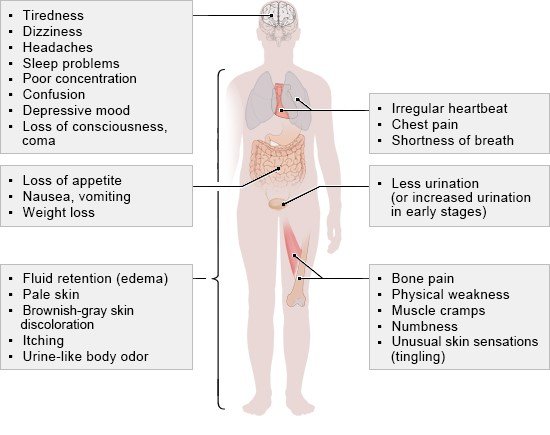Allen K, Damery SL, Sein K et al. How do patients and their family members experience the transition from peritoneal dialysis to incentre haemodialysis? A multisite qualitative study in England and Australia. Perit Dial Int 2022; 42(3): 297-304.
Bartlett Ellis RJ, Welch JL. Medication-taking behaviours in chronic kidney disease with multiple chronic conditions: a meta-ethnographic synthesis of qualitative studies. J Clin Nurs 2017; 26(5-6): 586-598.
Budhram B, Sinclair A, Komenda P et al. A Comparison of Patient-Reported Outcome Measures of Quality of Life By Dialysis Modality in the Treatment of Kidney Failure: A Systematic Review. Can J Kidney Health Dis 2020; 7: 2054358120957431.
Cassidy BP, Harwood L, Getchell LE et al. Educational Support Around Dialysis Modality Decision Making in Patients With Chronic Kidney Disease: Qualitative Study. Can J Kidney Health Dis 2018; 5: 2054358118803323.
Drawz P, Rahman M. Chronic kidney disease. Ann Intern Med 2015; 162(11): ITC1-16.
Foote C, Kotwal S, Gallagher M et al. Survival outcomes of supportive care versus dialysis therapies for elderly patients with end-stage kidney disease: A systematic review and meta-analysis. Nephrology (Carlton) 2016; 21(3): 241-253.
Fox DE, Quinn RR, James MT et al. Social Support in the Peritoneal Dialysis Experience: A Qualitative Descriptive Study. Can J Kidney Health Dis 2020; 7: 2054358120946572.
GBD Chronic Kidney Disease Collaboration. Global, regional, and national burden of chronic kidney disease, 1990-2017: a systematic analysis for the Global Burden of Disease Study 2017. Lancet 2020; 395(10225): 709-733.
GBE-Bund, Statistisches Bundesamt (Destatis). Gesundheitsberichterstattung des Bundes. 2017.
Geberth S, Nowack R. Praxis der Dialyse. Berlin: Springer; 2014.
Gemeinsamer Bundesausschuss (G-BA). MAU-PD – Multidimensionale Analyse der Ursachen für die niedrige Prävalenz der ambulanten Peritonealdialyse in Deutschland. 2021.
Gemeinsamer Bundesausschuss (G-BA). Richtlinie über die Gesundheitsuntersuchungen zur Früherkennung von Krankheiten (Gesundheitsuntersuchungs-Richtlinie). 2021.
Girndt M, Trocchi P, Scheidt-Nave C et al. The prevalence of Renal Failure. Results from the German Health Interview and Examination Survey for Adults, 2008-2011 (DEGS1). Dtsch Arztebl Int 2016; 113(6): 85-91.
Greite R, Schmidt-Ott K. Was ist gesichert in der Therapie der chronischen Nierenerkrankung? [What is confirmed in the treatment of chronic kidney disease?]. Inn Med (Heidelb) 2022; 63(12): 1237-1243.
Häckl D, Kossack N, Schoenfelder T. Prävalenz, Kosten der Versorgung und Formen des dialysepflichtigen chronischen Nierenversagens in Deutschland: Vergleich der Dialyseversorgung innerhalb und außerhalb stationärer Pflegeeinrichtungen [Prevalence, Costs of Medical Treatment and Modalities of Dialysis-dependent Chronic Renal Failure in Germany: Comparison of Dialysis Care of Nursing Home Residents and in Outpatient Units]. Gesundheitswesen 2021; 83(10): 818-828.
Heaf JG, Wehberg S. Relative survival of peritoneal dialysis and haemodialysis patients: effect of cohort and mode of dialysis initiation. PLoS One 2014; 9(3): e90119.
Kidney Disease: Improving Global Outcomes (KDIGO). KDIGO 2012 Clinical Practice Guideline for Anemia in Chronic Kidney Disease. 2012.
Kidney Disease: Improving Global Outcomes (KDIGO). KDIGO 2013 Clinical Practice Guideline for Lipid Management in Chronic Kidney Disease. 2013.
Kidney Disease: Improving Global Outcomes (KDIGO). KDIGO 2017 Clinical Practice Guideline Update for the Diagnosis, Evaluation, Prevention, and Treatment of Chronic Kidney Disease-Mineral and Bone Disorder (CKD-MBD). 2017.
Kidney Disease: Improving Global Outcomes (KDIGO). KDIGO 2021 Clinical Practice Guideline for the Management of Blood Pressure in Chronic Kidney Disease. 2021.
Kidney Disease: Improving Global Outcomes (KDIGO). KDIGO 2022 Clinical Practice Guideline for Diabetes Management in Chronic Kidney Disease (CKD). 2022.
Kidney Disease: Improving Global Outcomes (KDIGO). KDIGO 2024 Clinical Practice Guideline for the Evaluation and Management of Chronic Kidney Disease (CKD). 2024.
Koch M. Nierentransplantation [Kidney transplantation]. Chirurgie (Heidelb) 2024; 95(2): 129-134.
Lukowsky LR, Mehrotra R, Kheifets L et al. Comparing mortality of peritoneal and hemodialysis patients in the first 2 years of dialysis therapy: a marginal structural model analysis. Clin J Am Soc Nephrol 2013; 8(4): 619-628.
Medical Netcare (MNC) im Auftrag des Gemeinsamen Bundesausschusses (G-BA). Jahresbericht 2016 zur Qualität in der Dialyse. 2017.
Meuleman Y, Ten Brinke L, Kwakernaak AJ et al. Perceived Barriers and Support Strategies for Reducing Sodium Intake in Patients with Chronic Kidney Disease: a Qualitative Study. Int J Behav Med 2015; 22(4): 530-539.
National Institute for Health and Care Excellence (NICE). Chronic kidney disease: assessment and management (NICE Clinical guidelines; No. 203). 2021.
Ng CH, Ong ZH, Sran HK, Wee TB. Comparison of cardiovascular mortality in hemodialysis versus peritoneal dialysis. Int Urol Nephrol 2021; 53(7): 1363-1371.
Palmer SC, Hanson CS, Craig JC et al. Dietary and fluid restrictions in CKD: a thematic synthesis of patient views from qualitative studies. Am J Kidney Dis 2015; 65(4): 559-573.
Palmer SC, Palmer AR, Craig JC et al. Home versus in-centre haemodialysis for end-stage kidney disease. Cochrane Database Syst Rev 2014; (11): CD009535.
Raoofi S, Pashazadeh Kan F, Rafiei S et al. Hemodialysis and peritoneal dialysis-health-related quality of life: systematic review plus meta-analysis. BMJ Support Palliat Care 2023; 13(4): 365-373.
Reid C, Seymour J, Jones C. A Thematic Synthesis of the Experiences of Adults Living with Hemodialysis. Clin J Am Soc Nephrol 2016; 11(7): 1206-1218.
Vale L, Cody JD, Wallace SA et al. Continuous ambulatory peritoneal dialysis (CAPD) versus hospital or home haemodialysis for end-stage renal disease in adults. Cochrane Database Syst Rev 2004; (4): CD003963.
Wongrakpanich S, Susantitaphong P, Isaranuwatchai S et al. Dialysis Therapy and Conservative Management of Advanced Chronic Kidney Disease in the Elderly: A Systematic Review. Nephron 25.05.2017 [Epub ahead of print].
Zazzeroni L, Pasquinelli G, Nanni E et al. Comparison of Quality of Life in Patients Undergoing Hemodialysis and Peritoneal Dialysis: a Systematic Review and Meta-Analysis. Kidney Blood Press Res 2017; 42(4): 717-727.
IQWiG health information is written with the aim of helping people understand the advantages and disadvantages of the main treatment options and health care services.
Because IQWiG is a German institute, some of the information provided here is specific to the German health care system. The suitability of any of the described options in an individual case can be determined by talking to a doctor. informedhealth.org can provide support for talks with doctors and other medical professionals, but cannot replace them. We do not offer individual consultations.
Our information is based on the results of good-quality studies. It is written by a team of health care professionals, scientists and editors, and reviewed by external experts. You can find a detailed description of how our health information is produced and updated in our methods.


